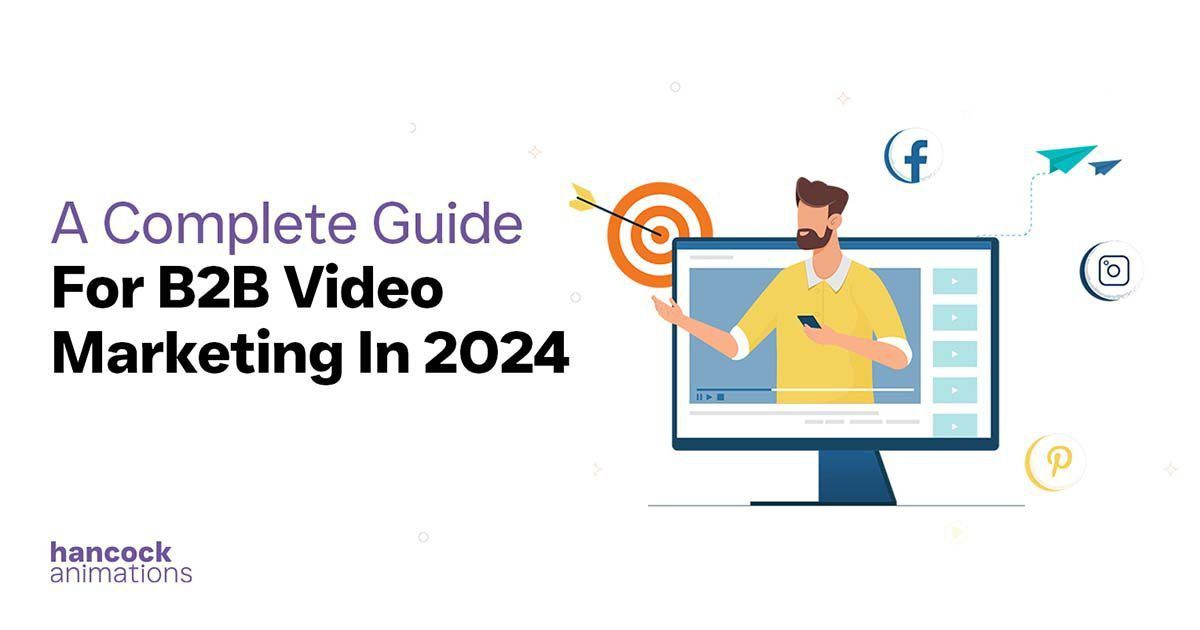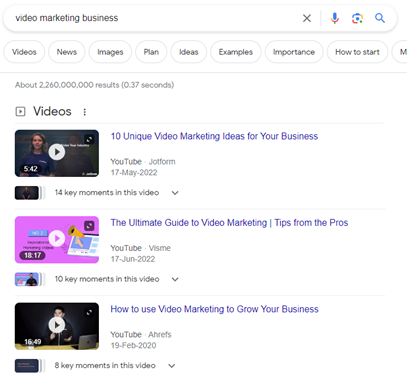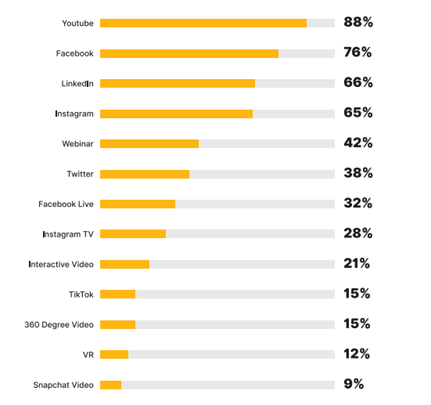A Complete Guide For B2B Video Marketing In 2024

Are you just starting to take your B2B business online? If so, we have a fantastic tool to introduce to you: B2B video marketing services. It’s not just a tool; it’s a powerful way to connect your brand with your customers, both the ones you already have and the ones you’re trying to reach.
Here’s the scoop: Nowadays, half of B2B businesses are going digital, and one of the key things they’re doing is using videos. If you haven’t started working on a B2B video marketing strategy yet, it’s time to gather your team and get started.
What Is B2B Video Marketing?
B2B video marketing involves the strategic use of video content to engage and influence other businesses or professionals. This approach differs from B2C (business-to-consumer) marketing, as it caters to the unique needs and interests of a B2B audience.
B2B video marketing encompasses various video types, including product demonstrations, customer testimonials, educational content, webinars, and more. These videos serve to inform, educate, and build trust with potential B2B customers. They can be shared through various channels, such as websites, social media, email campaigns, and even during sales presentations, to effectively communicate the value of products or services, establish expertise, and foster connections with other businesses.
The Importance Of B2b Video Marketing
Videos have become a preferred form of entertainment and information consumption in recent years. With platforms like YouTube, video content has become easily accessible to a global audience. It has grown so much that in 2022, around 82% of the internet traffic was online video streaming.
Video content has the power to keep viewers engaged for a longer time than other forms of content, and B2B marketing videos help a brand build a bridge that connects the customers to the brand.
Such video content allows the brand to portray itself as an expert in the industry. You can share knowledge with your customers and viewers about the industry, how it works, what they should expect, etc.
B2B video content also helps a brand improve its conversion rate and attract more and more people to it.
Top 3 Benefits of B2B Video Marketing
B2B video marketing offers numerous advantages for businesses, and Hancock Animations stands out as a provider of top-notch video marketing services.
When it comes to your brand, leveraging B2B video marketing content brings the following key benefits:
1. Improved Search Ranking
Video marketing content hugely impacts search engine rankings, as it is ranked higher on search engines compared to other types of content, i.e., pictures, blogs, etc.
A number of big brands use video content on their website because Google’s search algorithm gives better exposure to video content.

It ultimately brings more viewers to your website/landing page. So, instead of investing your precious time solely in other content, you should start creating videos about your brand to gain higher exposure and rank better on the Google search engine.
2. Better Engagement
Video marketing content makes lead generation and engagement a lot easier. Almost 50% of businesses worldwide use video content to attract potential customers and to keep the existing ones interested in the brand, and it will only grow.
Also, adding video content to a website’s landing pages, homepage, and product pages will keep the viewers on that page for a longer time and increase the likelihood of them buying your services.
But for that, your videos have to be engaging and provide some sort of benefit to the viewer. Explainer videos, how-to-use product videos, webinars, etc., help you capture leads and convert visitors into potential customers.
You can also add CTA (call to action) in your videos to redirect viewers back to your brand.
3. Account Based Marketing
Since 2020 brands started focusing more on personalized account-based marketing strategies. It is best if you are a B2B business and plan to target a specific niche. When everyone sends a long wordy email, you can easily attach a video to it and propose your idea.
CEOs and other higher authorities receive thousands of emails and messages on a daily basis. So, instead of delivering your pitch the same old way, why not fancy things up a little and add a video to your email?
Experience the impact of high-quality B2B video marketing.
Connect with us to discuss your project goals.
Creating A Successful B2B Video Marketing Strategy
Often, when brands are asked why they haven’t ventured into video marketing, they express uncertainty about where to begin. If you find yourself in this situation, there’s no need to despair. We’re here to provide guidance on creating accessible and captivating video content.
But first, you will need an effective B2B video content strategy to start with. Without a complete plan, you cannot start working on a marketing campaign or initiate a sales operation. But where to start from?
First of all, you have to ask yourself, “Who is your audience?”
Many B2B companies get stuck when it comes to creating videos because they fail to reach a grand audience on the first try. But what they do not understand is that the slightest attraction is better than none at all.
Small-scale videos also help you with determining your target audience, what sort of content they like, and how you can convey your message. You need to focus on these factors while planning your B2B video marketing strategy.
On that note, let us get to how you can create an effective video marketing strategy:
1. Set Goals for the Content
Why are you making this video? What do you plan on achieving from it? You need to keep your ultimate goal in mind while creating video content. It would be better if you had a single goal in mind. Then you can incorporate each video around that goal.
Decide which stage of the business funnel you would like to target and then focus on that while creating the video for your brand.
2. Determine a Budget
Whether you hire someone to create the video or you do it in-house, you should consider the production cost and time. If you are creating it on your own, then you will need a good camera, excellent editing skills, and a system that can handle the work.
Whereas, if you hire a company like Hancock Animations to make the video, you will not have to worry about equipment, script, location, videography, and even travel costs. You will simply pay a company to get the work done.
So, if it seems like you have the budget and the opportunity to hire someone good, then we suggest you invest your money in a professional video production company like Hancock Animations.
3. Pick a Video Style
In the beginning, you should experiment with a variety of videos. Pick a video format that fits perfectly to your goal. For example, you can start your video with a bit of awareness about the brand and the product. Then you shift to how it can benefit the buyer, and then conclude with why should the buyer choose you.
Your video should have a smooth flow. Each section should show coherence, and every reasoning must have a purpose.
4. Pick the Platform
You should pick the platform depending on your video’s goal and the type of audience you plan on targeting.
For example, if you are only creating one or two types of video content, then it is best that you begin with a single platform like Facebook or YouTube and then build your fan following from there.
You can start with a basic brand video and share it on your website and on your Facebook to raise awareness and attract more audiences. You can also make videos about how your brand processes to build trust between your viewers and the brand.
5. Create the Video
Top-quality video production is a lot more than setting up a camera, pointing it at someone, and asking them to say some lines about your service or product.
In today’s world, everyone wants quality and value in content. Meaning, you have to focus on whether your content is professional enough or not.
This is the time when you have to decide whether you are going to invest all that money into buying the latest equipment and take out time to record new content or you are going to hire a professional team and walk them through your vision. So they can get the work done.
6. Upload the Video
Many platforms have some restrictions on the video type, the length of the video, and how you can publish it. So, it would be best to check the platform’s requirements before you pick it.
You should also check whether it is a great fit for your video and whether it will help your video in achieving the goal.
7. Promote the Video
Whether you pick Facebook, YouTube, Vimeo, or any other platform to upload your video, you need to understand that your job is not done with uploading the video. Actually, your real work has just begun.
Platforms like YouTube and Facebook allow you to boost your video’s engagement by responding to comments, providing feedback, and running ads.
8. Track the Video’s Performance
This is an essential step after you have uploaded the video, and there are two reasons why:
- If you just leave your video after uploading it and do not track its performance, you will not be able to see whether the audience liked it or not or whether it was able to achieve the goal.
- Also, if you keep tracking your video’s performance, then you will learn what you need to improve to make the video worth watching and meet the expectations.
5 Types of B2B Marketing Videos
If you are a B2B brand, you must have tried advertising yourself in a way that pulls consumers away from your competition and makes them believe that they can trust your brand. How about you incorporate a similar trick with B2B video marketing?
You can show the consumers how you deal with people, what makes your brand stand out, what is your brand motto, and how you value your customers.
This will not only spread awareness about your brand to a larger market, but it will also show how they can benefit from your services or products.
But suppose you are in the initial stages of B2B video marketing. In that case, you will have to experiment with different types of videos until you figure out what your audience likes, and to help you with that, we have come up with a list of 5 top-rated B2B marketing video types.
So, without further delay, let us get into it.
1. Explainer Videos
Explainer videos are precisely what the name suggests. It is a compilation of videos where you visually describe a product, how you can use it, what its benefits are, what your business is, and your team members. It can explain anything.
You can either hire a person to act in the video or get an animator like Hancock Animations to animate the video for you and explain the process with text.
If you want, then you can also incorporate someone from your team, who is well aware of the product in your video, and let them explain the product to the viewers.
Such videos work best for the B2B market because explainer videos directly target the customer and their problems and provide a solution. Explainer videos are also extremely popular among B2B businesses because they offer abstract products such as apps, tools, or services.
Before you record the video, we suggest that you look into the following things:
- Is your video engaging enough? Because the majority of consumers prefer videos over pictures and infographics. So, whether you are recording the video or getting it animated, each shot is engaging.
- Explainer videos are supposed to explain. So, it should be filled with relevant information.
- The video should not be too long, or else the viewers will get bored.
2. Case Study Videos
If you plan to convert viewers into potential clients with your video marketing content, then case study videos will help you achieve that goal.
In this type, you will show how your brand is different from the rest in the market, how you process it, what your brand is based on, and how to achieve your goals.
It will showcase your brand as a transparent body, and the viewers will find it easy to trust someone who can talk about such things openly.
3. Testimonial Videos
What other way to promote your B2B business than showcasing some satisfied customers? Consumers trust a brand when they see a satisfied customer. So, recording the testimonials of your customers talking about how your product or services helped them will play to your benefit.
Such stories will also catch engagement and are easy to record. You can simply ask a client to record the video and upload it on your social media platform.
4. Service or Product Videos
Whatever your product or service shall be, these videos will allow you to talk about it in detail with the customers. You can discuss the product’s manufacturing, its benefits, its effects, and its reviews, and also answer if your customers have any queries about the product.
The video will serve the purpose of generating awareness and showcasing your services or products at the same time.
5. Brand Videos
Brand videos, as the name implies, should be focused on elaborating your vision and brand to the customers instead of your products or services.
The main mission of these videos is to open yourself up and let your customers know more about your brand and how you can benefit them.
It gives you a grand audience to share your message and build awareness that you exist in the market.
Why Invest in B2B Video Marketing?
Creating videos is no longer looked at as a training or sales tool. It is one of the core tools of a company’s plan and is extremely versatile. If you are a B2B business, then video marketing is the quickest way for you to earn your customer’s trust and build a strong relationship with them.
The following statistics will help you see how video marketing has helped the B2B market grow:
- A video marketing strategy provides 88% positive ROI on investments.
- Almost 95% of B2B businesses have increased their video-making budget yearly.
- 75% of the audience prefers videos over pictorial or text content.
Video marketing allows the brand to easily engage with its audience through multiple platforms. You can educate them, win their trust, and expand your reach with minimum effort. B2B video marketing even increases your customer’s buying instinct.
4 Uses of B2B Video Marketing
B2B video marketing serves a variety of purposes and can be used in multiple ways to achieve different business objectives. Here are four common uses of B2B video marketing:
Social Media Video Marketing
To expand your reach and gain more audience, you will first have to establish a strong social media appearance, and these videos will help you achieve that goal.
A platform like LinkedIn is a great place to connect with business individuals and capture their interest. Almost 87% of LinkedIn marketing is based on video content. So, it is a good place to start with.
YouTube is the world’s largest video channel, but that also makes it difficult and tiring to get noticed. Instead, Facebook and Instagram are more useful for B2B business.

Website Video Marketing
Adding video to your website pages can help the audience learn better about your business. Videos like explainer videos, product videos, and testimonials allow you to open a gate for potential customers to peek in and see what your brand stands for.
Email marketing
Even though adding video to an email has shown tremendous success and is extremely popular, there is still a large number of B2B businesses that do not use this method.
You need to understand that if you plan on targeting millennial buyers, you will have to shift your focus from lengthy emails and long PPTs and shift to easier, shorter, and more engaging means.
Video Hosting Platforms
Websites and social media platforms are good places to attract an audience and increase engagement. But you can expand the circle and target direct audiences from different platforms to your website as well.
These are some of the most popular video platforms:
- Vimeo: You can add CTAs and emails for lead generation.
- Wistia: Allows you to easily customize and analyze the video.
- YouTube: It is a free platform and has an easy-to-use interface.
- Vidyard: SEO optimization and unlimited video uploading.
Hire a Seasoned B2B Video Marketing Expert for Your Success
For a B2B business, targeting the right audience and delivering them satisfactory content is extremely important. For that, you need an experienced team with excellent skills to outshine your competition.
If you have the resources, you should start focusing on creating more video marketing content. However, if you are tight on the budget and are unsure how to generate new video content, then hiring a professional team like Hancock Animations is a smart move.
We at Hancock Animations ensure to portray your business model through each video and create unique content suitable for your brand.
Wrapping Up….
B2B video marketing offers a powerful means to simplify complex ideas and engage your audience in a captivating way. These videos not only enhance your business’s visibility but also serve as a magnet for attracting new customers consistently.
So, talk to your people, brainstorm, and start working on a few ideas to begin with. Create interactive videos to boost your business and grow your online presence.
Your innovative ideas deserve a spotlight.
Contact us today and let’s bring them to life!
B2B businesses can create various types of videos, including product demos, explainer videos, customer testimonials, case studies, thought leadership videos, event coverage, and webinars. The choice of video type depends on the marketing goals and the target audience’s preferences.
To optimize B2B videos for search engines, use relevant keywords in titles, descriptions, and tags. Ensure your video content aligns with the search intent of your target audience.
Additionally, consider hosting videos on your website or a platform that supports SEO and embedding them in relevant blog posts or landing pages.
To measure the effectiveness of B2B video marketing, track key performance indicators (KPIs) such as video views, watch time, click-through rates, conversion rates, and engagement metrics. Additionally, use analytics tools to gain insights into audience behavior and preferences.

